This article contains full spoilers through the 3rd season of Attack on Titan, currently available on Hulu.
Not too long ago I wrote about how I had begun watching anime after years of snubbing the genre. It was really only a matter of time, then, before I jumped into Attack on Titan. The manga to which it is very faithful has enjoyed massive popularity, and the show itself was Funimation’s top streamed in 2014. Griffin had recommended it to me, saying that while it was certainly a bit heavy (my stated reason for passing on Psycho-Pass after a few episodes), its approach to world-building was really interesting.
I found that to be quite the understatement. I was absolutely hooked from the get-go.
The Premise
As a quick overview for anyone unfamiliar (again, I’ll remind you about the spoilers to come in this piece), the premise seems simple at the outset: we’re told that there exist creatures called “titans”; giant, human-like beings that eat any people they come across. In unsuccessfully fighting the titans, humanity had been mostly wiped out, the only survivors retreating to an uneasy safety within a walled-kingdom. Thrice, walled, in fact. The only way in or out is through gate-towns containing one outer and one inner gate, of which there are four on each wall.
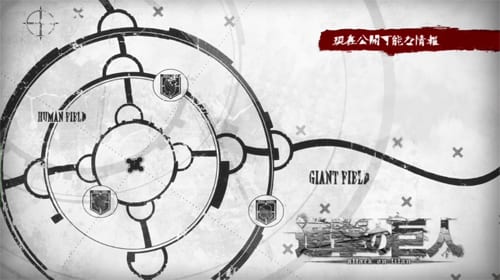
The walls have stood for 100 years and it’s been dandy. So of course in the pilot episode, the gate-town of Shiganshina falls. The story that follows centers on three children: Eren Yeager, Mikasa Ackerman, and Armin Arlert from Shiganshina. Eren loses his mother in the attack (also Mikasa’s guardian), and though his father never turns up, he has a mysterious dream that night in which his father appears to him and tells him that everything can be explained if Eren can get to the cellar of their house, which had tragically just been crushed by a boulder. More suspiciously still, the key to the cellar Eren had a vision about appeared around his neck.
The three children retreat as refuges inside the second wall, and live there for 5 years until they are old enough to become military recruits. Eren’s motivation is to kill all titans in a sick revenge, Mikasa wants to protect Eren, and Armin (the strategy-guy of the group) remains curious about the world beyond the walls.
And…that’s basically the premise. We follow this trio as they train up in the military, their eyes permanently on the Scouting regiment—the wing of the military that actually ventures beyond the walls. All along the way, however, we begin to learn more and more about the nature of the titans. It starts simply, though curiously: they don’t need to eat humans for sustenance, for instance. There are also “abnormals,” an umbrella term for any titan that doesn’t act like the others. However, each tidbit we learn becomes more and more intriguing with the passing episodes.
Things accelerate when Eren somehow transforms into a titan himself, fighting the other titans to save his friends. Naturally this makes the military highly suspicious, but we soon find that it also makes Eren a target…to other “titan-shifters”, revealed within their own ranks. By the end of Season 1, Eren bests one of these titan-shifters who then encases herself in a cocoon, and oh yeah, it’s revealed the walls are actually made of titans. So weird, right?
You can probably tell that this breadcrumb approach to worldbuilding is one that I instantly gravitated towards. I don’t mean to sell other aspects short: some of the characters are very engaging, such as my personal favorite Sasha Braus (“potato girl”), as well as Hange Zoe, a delightfully inquisitive scientist-type. I also find this a thematically rich show, using the dystopian setting to grapple with topics such as hopelessness, meaning, sacrifice, the value of humanity, and justice.
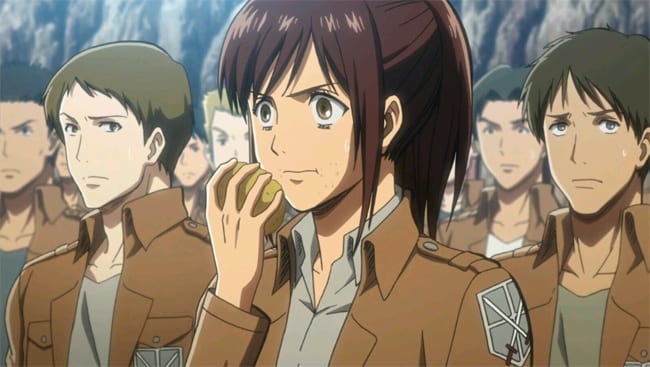
Still, it was the worldbuilding and mystery of the titans that had me. Which is why I started to get bad Lost flashbacks. Being me, I asked a simple question on social media: was Attack on Titan going to betray me in the same way?
Those Jewish Titans
The responses I received could not have shocked me any more: the show is horribly antisemitic, the story embraces nazi rhetoric/has fascist subtext, and there’s also strong anti-Korean sentiment throughout—the last of which was something publically articulated by author and illustrator (Hajime Isayama) of the manga.
At the same time, I also got many responses telling me “no, it’s actually not antisemitic, and people wrongly characterize it as such.”
I think off the bat, I want to say that I don’t know much about Hajime Isayama, and I don’t have a particular interest in going out of my way to defend him or speak to his intent. We can look at the work, because even the peachiest of all intents can lead to hurtful outcomes that should be heard.
I will also admit that I am an American consuming this show. I am fairly ignorant in the ways in which anti-Korean sentiments from a Japanese point of view would look within media, or implications that could point there. From my vantage point, I haven’t picked up on anything like that in the anime, but I suppose it’s also possible there’s more left turns to come.
It could be argued that this show has pro-military messaging? To that, I don’t see anything above and beyond the pale of a Marvel movie. And you know, the Scouts aren’t actually real, so what would it be promoting, exactly?
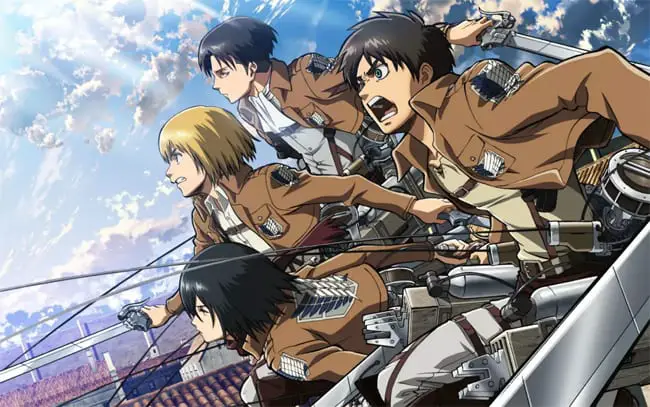
One thing I am rather sure of, though, is that Griffin—who is also caught up on the manga—would not have recommended a show (or liked it himself) if he believed it was an antisemitic tale in any way. Griffin does not speak for all Jews, of course, nor do I, and the ways in which we engage with media or what we’re willing to accept as an unfortunate implication is going to be wildly different from others. However, his stamp-of-approval was enough for me to keep watching.
What does this all boil down to? Well, when we finally get to the cellar—after episodes and episodes of intrigue, betrayal, action, a brain-washing royal family led by a titan-shifter, a military coup d’etat, a recruit discovering his mother became a titan, and Armin being brought back from the brink of death—we learn that the titans are Jews.
It’s not that simple though. Basically, the people within the walls…they’re not the last of humanity at all. They’re on an island, almost like a penal colony, because they are a hated ethnic group—I believe the show does use the term “race”. They are “Eldians” or “Subjects of Ymir”…people who have the capacity to be turned into titans.
There at some point in time was an Eldian Empire, but after some war, they lost to the Nation of Marley. Eldia’s capital was moved to the island, and the Eldian King—a titan-shifter that could control other titans—created the walls to ensure no one would try to go to the mainland. To further ensure this, the king also partially mind-wiped his subjects to make them forget about all other humanity (only possible as a result of being one kind of titan-shifter with specific royal lineage). He also told mainlanders that if they came near, he’d basically flatten the world with all the titans he could control. Meanwhile on that mainland, the Marleyans kept Eldians in internmant zones, where they needed to wear armbands.
The Marleyans also experimented on the Eldians, turning them into titans by injecting them with spinal fluid. From what it seems like, most of the titans that surrounded the walls our main characters were fighting had been from Marleyans injecting Eldians, then shoving them down to the island (there was an outer wall near the sea that Marleyan soldiers could stand on top of).
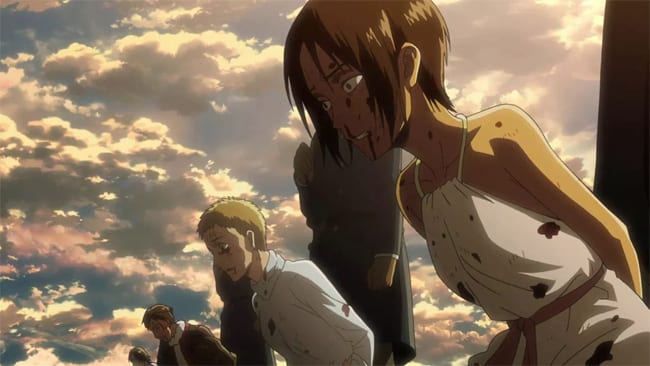
This is basically where Season 3 ended: we found out the truth of their heritage, and also now appreciate that they’re on a tiny island and had a tentative peace for 100 years, but that literally the entire world hates them, so when will they actually be free? Also, of course, those titans they slaughtered along the way were their own kind.
When I lay it out like that, it really sounds like something that should deeply upset me. Those monstrous creatures? They’re basically Jews, since we see them wearing armbands, being ordered around by obvious nazi stand-ins, and everyone has Germanic names. And yeah, that parallel is really clear. Eldians are this world’s Jews, if we’re trying to look for any near allegory. I have no doubt this was intentional.
At the same time, look what the story being told is: the Eldians are the good guys. Everything they’re grappling with, about the cost for the survival of humanity…it’s really about the survival of who they are. Eren ends season 3 saying that on the other side of the sea are more enemies. “If we kill all our enemies…over there…will we finally…be free?” Eren isn’t the world’s healthiest guy in his mindset (it’s also a dystopia), but as a member of a cultural group that’s hated basically by everyone, it’s a sentiment that I don’t find foreign.
It’s also a bit beyond that. Everything we’re told about what that ~Evil Eldian Empire~ did was quite clearly Marleyian propaganda. We see Eren’s father purposely digging into it for that reason. Now, he came to the conclusion that the Eldian Empire should be restored, but at least my own take-away is that he wasn’t exactly balanced in that view-point. Plus…that was one flashback before he became a titan-shifter himself, so I’m skeptical if that was his end position or meant to be viewed as particularly noble.
We’ve actually never seen Eldians become titans (with the small exception of those becoming titan-shifters) by any else’s hands but the Marleyians, via injections. Could this have been more defensive in nature in the past for the Eldians? Could this have been entirely forced on the Eldians? We just don’t know. You don’t get an empire by simply braiding people’s hair, sure, but the evilness of the Eldians that the Marleyians are spreading on the mainland just…isn’t backed up by anything we’ve seen. Least of all, our core cast of Eldian characters who are trying to do right by everyone.
That’s not to say I feel 100% rosey about this, however. There are aspects of Jewish!titans that make me uneasy. For one, take a look at the titans:
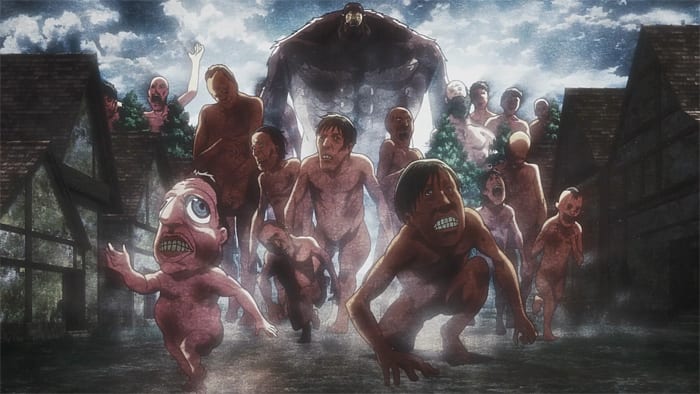
The way in which they’re distorted, at least to me, kind of reminds me of political cartoons. It’s the stretched features into something both more monstrous and pathetic at the same time. And there is certainly a dark history in terms of Jewish portrayals as such.
Secondly, the discrimination of the Eldians is based upon the fact that they have this monstrous capacity within them. They are Subjects of Ymir, and even as the sweetest people ever, they are the ones who can become these cannibalistic monsters. Again, we haven’t actually seen how the Eldians would choose to use this power if not in a desperate situation. At the same time, that is a terrifying capacity, and from a certain point of view it makes containing them almost feel logical in a way that internment zones should really never be portrayed. Jews in Germany really weren’t causing the economic downturn, you know?
Finally, the royal Eldian family can brainwash other Eldians. Without anything else, okay, but in the context of these clear Jewish stand-ins, that evokes some not…great…stereotypes. Like how we’re apparently in charge of the media and spread our lies through it, or whatever. Maybe it’s a stretch for that one since it can’t work on those goys, but it was just an aspect that made me go, “ehhhhhh.”
The thing is, though, if this were in any way sympathetic to nazis, the story would look a whole hell of a lot different. The Marleyians we’ve seen are portrayed as horrible assholes that I don’t see anyone sympathizing with (they set dogs on a small girl for kicks), and it’s pretty dang obvious that they’re giving a very distorted account of the Eldians. Moreso, the Eldians are our protagonists. There’s schmucks among them, sure, but I also don’t see anyone rooting for an outcome where they’re all held in internment zones, or all turned into titans as cynical weapons for someone else. We as the audience are invited to want them to triumph—to actually be free. The story is about what path can actually get you there, and what sacrifices should (if any) be made along the way?
My point is, this is a very odd way to go about trying to demonize the people that can turn into the titans. I’m not 100% sure it won’t end there…it just feels off to me that it would, however.
I do think there are likely plenty of Jewish viewers who see the implications I listed and get fully turned off by it, even with the story rooting for the Eldians. I fully understand that reaction, though if it’s not where I land. But I also suspect there are a lot of non-Jewish viewers who might hear the critique of something being antisemtic, or might just think “titans = Jews = bad” without critically engaging, since you know…they feel it might not be their place. I respect that attitude—don’t get me wrong. I just also think sometimes there is a tendancy for us to see antisemitism in very surface-level ways because of an understanding of one or two stereotypes (Littlefinger has money and is short!) and chop the dialogue there. That’s always bothered me, since from an entirely other lens, this show is one about Jewish resistance.
That’s the lens from which I engage, and I could get very, very burned by it. I’ll be the first to tell you I was wrong. But my own 2 cents, for whatever they’re worth, is that this is at least a show to be with for the ride. We just need to be sure to be looking in all directions along the way.

